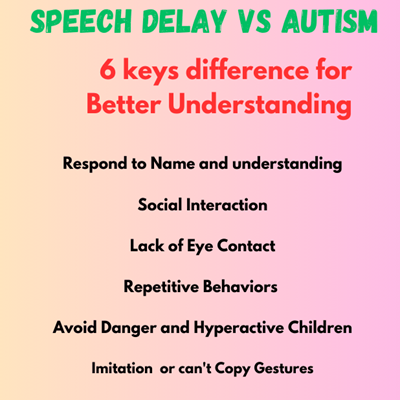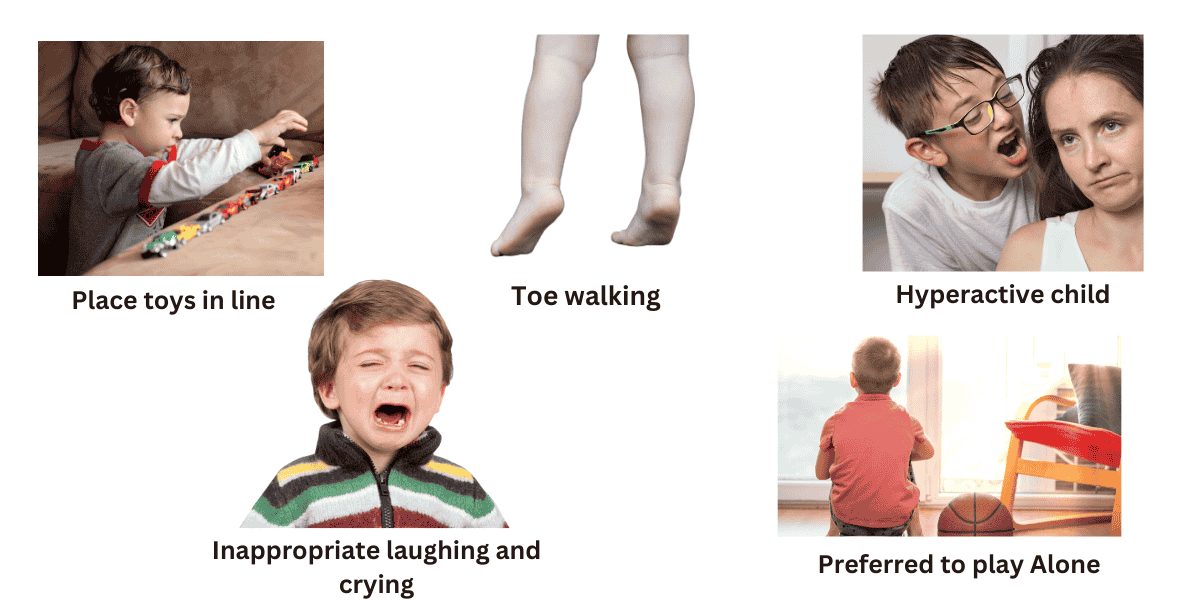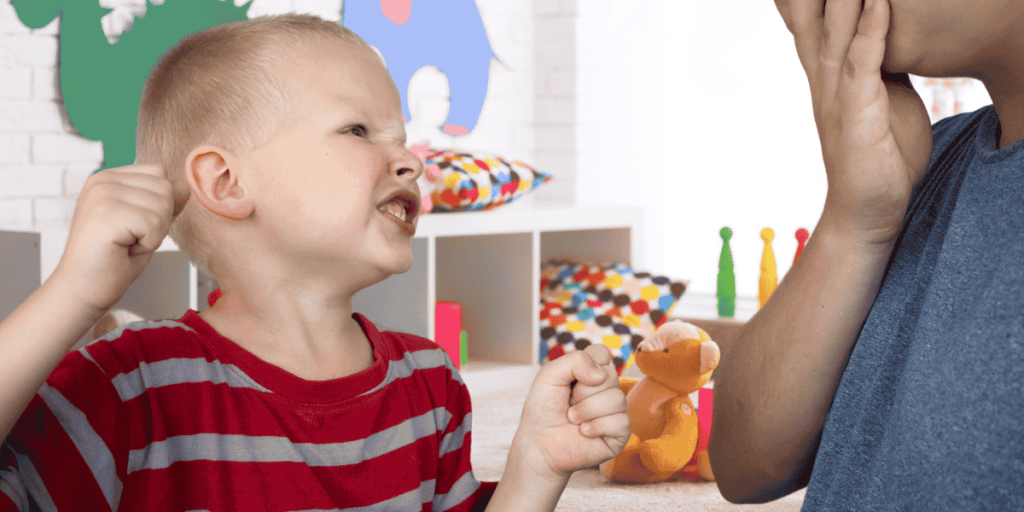In this blog, we will help you clear your confusion about Speech Delay vs Autism. Children’s ability to speak and interact socially is a crucial part of their development. However, when a child struggles to speak or has trouble communicating even with their parents, it can leave them feeling worried and confused. Many parents wonder, “Does my child have a speech delay, or is it autism?”

Table of Contents
Speech Delay vs Autism: 6 Keys Difference for Better Understanding
In this blog, we will share 6 important steps to help you understand the difference between speech delay and autism. After learning these key points, you’ll be better equipped to recognize whether your child is facing a speech delay or signs of autism. So, let’s begin!

Respond to name and understanding.
Speech Delay
your child will still understand a lot. They’ll use gestures to communicate and understand emotions. They’ll be aware when their parents leave the room or when something is happening around them.
Whenever you call a child with a speech delay, they respond and may even come to you immediately.
Autism
the child may not understand or react emotionally the same way. They might not point to things or react when you call their name. They do not respond to their name.
Your child may not look at you when you call their name. This is why it’s very difficult to toilet-train these children, as they lack understanding. They don’t relate the words “Mumma” or “papa” to their mother or father when they say them.
Social Interaction
Speech Delay
If the child has a speech delay, he will make proper eye contact and also smile socially. He will be able to convey everything through facial expressions and gestures.
Autism
If a child is autistic, they will not feel comfortable in certain situations. The child will want you to take them away from that place quickly because they don’t like to socially interact.
Lack of Eye Contact
Speech Delay
When you try to teach something to a child with a speech delay, they learn after being told once or twice. They listen to you calmly while making eye contact.
Autism
Even if you try to teach these children something, they won’t even look up at you. They can’t keep their focus in one place, and they have a significant lack of focus and attention.

Repetitive Behaviors
Speech Delay
In the case of speech delay, a child who can’t speak may feel frustrated, but they do not show any repetitive behaviors.
Changes in their daily routine don’t affect them much.
Autism
Autism often involves repetitive actions like hand-flapping, spinning, or lining up objects in a very specific way. These children are fascinated by moving objects, like a spinning fan or the wheels of toy vehicles. If you’re walking on the road, they will keep watching the wheels of passing vehicles. They also tend to play in the same repetitive way.
Autistic children are very strict about their daily routines.
Avoid Danger and Hyperactive Children
Speech Delay
In the case of speech delay, these children know where they might get hurt. They understand which things can be harmful to them. They are not hyperactive and play normally with other children.
Autism
Autistic children cannot sit still in one place; they run around all day. They keep jumping and hopping all the time, and they might even jump from any spot. Some children even stand in front of moving vehicles because they are fascinated by rotating wheels. Due to sensory issues, they don’t understand danger.
Imitation or can’t Copy Gestures
Speech Delay
In case of speech delay, if you ask them to copy any gesture, they will be able to copy you easily, these children do not face any difficulty in copying or learning gestures.
Autism
Autistic children do not quickly learn gestures like bye-bye, namaste, tap tap, blink eyes, touch body parts, eyes, nose, etc. If you ask them to copy any of your gestures, they will not be able to do it. But with routine practice, these children learn the gestures.

Child Milestones According to Age
This topic is very important because, until parents understand whether their child is experiencing speech delay or autism, they can’t start the necessary therapies during the crucial early years, especially before the age of five. Without clarity, parents might stay confused, thinking, “My child doesn’t have autism, it’s just a speech delay.”
Let’s first talk about normal milestones for speech:
- At 15 months: A child should be pointing and using gestures to communicate. For example, if they want to be picked up, they’ll raise their arms towards you.
- At 18 months: The child should have about 20 to 30 words, including nouns, verbs, and some adjectives.
- At 2 years: They should have 50 to 100 words and be forming two-word phrases like “mama eat” or “want water.”
- At 3 years: The child should be able to make full sentences, and they start using more complex words and asking questions like “What?” and “Where?”
If your child isn’t meeting these milestones, they may have a speech delay. But speech delay alone doesn’t necessarily mean autism. For more detail Also read: Speech Therapy For Autism: 10 Proven Ways For Speech Development At Home.
Parents Confusion
- From a professional point of view—as an educator or child psychologist—the difference between the two is quite clear. But I’ve seen that many parents are confused. For example, a child may get diagnosed with autism at a hospital and then start therapy, but when they visit a speech therapist, they might hear, “Your child only has a speech delay, not autism.” This creates confusion.
- Another common issue is when parents ignore early signs because they believe that “the father spoke late too,” so they assume the child is just a late talker. This thinking can delay intervention until the child is four years old. Early intervention is key to recovery, so today I want to help clear up this confusion. You can easily figure out at home whether your child has a speech delay or autism by looking at a few signs.

Breaking Barriers: What to do Next?
If you feel that your child matches any of these clues in the Autism section, then you should immediately consult a development pediatrician for your child. And whatever the pediatrician suggests for your child, like therapies or a special school for your kids. Accept it and start your child’s treatment as soon as possible.
If your child is diagnosed with Autism, For more detail also read 4 Life-Changing Steps to Severe Autism Reversed: From Struggle to Victory
If any of the 6 clues mentioned above match your child’s behavior, then follow the key points given below. These key points are :
- Consult a professional
- Early Intervention
- Create a Supportive Environment for Your Child
Final Thought
My main goal with this blog is to help parents understand whether their child has just a speech delay or also autism so that the right therapy can begin as soon as possible. If your child has been diagnosed with autism by a reputable hospital, I encourage you to accept the diagnosis and start therapy early. Don’t let confusion delay the help your child needs.
Frequently Asked Questions (FAQs)
Is Speech Delay Genetic?
Yes, speech delay can be genetic, but if a child is unable to speak for a long time, it’s important to consult a developmental pediatrician.
Can you lose speech with autism?
Yes, some children lose their speech, and this often happens between the ages of 18 to 24 months. However, not all children need to experience speech loss.
At what age is autism diagnosed?
Autism is usually identified between 18 to 30 months of age, allowing early intervention to begin and treatment to start as soon as possible.
What is the root cause of speech delay?
The root cause of speech delay can be many factors, such as autism, weak oral motor muscles, genetics, or environmental factors. Speech delay may also occur due to these reasons.
What vitamins are good for speech delay?
Vitamin B12, vitamin D, and omega-3 play a crucial role in brain development and speech. However, it’s essential to consult a dietitian and developmental pediatrician before using these supplements.
Can screen time cause speech delay?
Yes, excessive screen time can cause speech delay because it prevents children from communicating face-to-face with others, which is essential for language development.

Pingback: What is Autism, Symptoms and Treatment